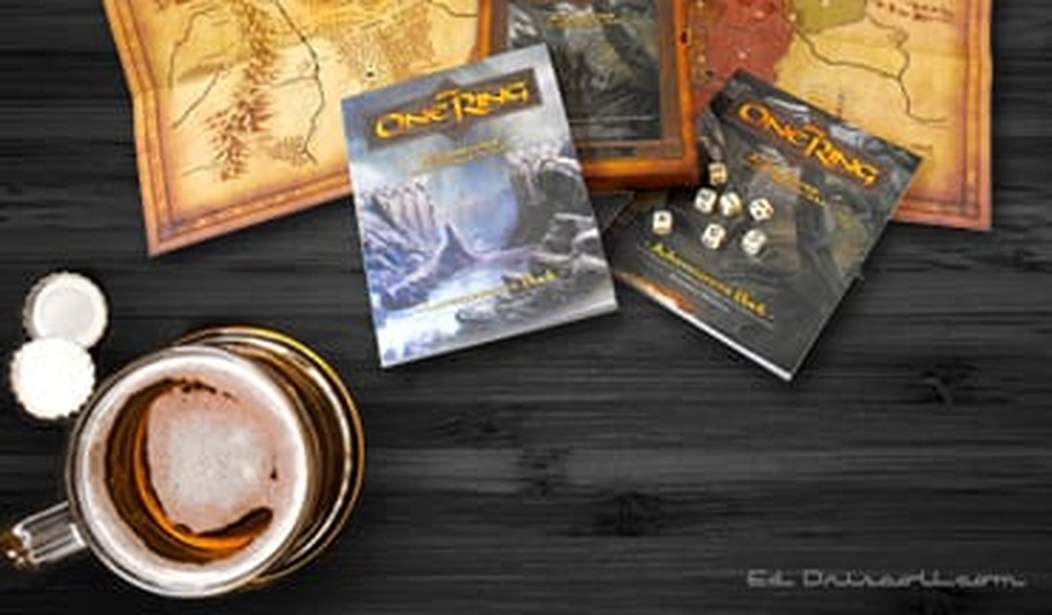Recently, British roleplaying game (RPG) company Cubicle 7 announced that they will be making a D&D Fifth Edition RPG based off of JRR Tolkien’s Lord of the Rings (LotR) series. This will be the fifth time that LotR has been turned into a RPG (or sixth, depending on who you ask*); and the news seems like to be a suitable jumping-off point for discussing RPG licensing, and why you see it happen a lot when it comes to science fiction, fantasy, and horror intellectual properties (IPs). Not so much for IPs in other genres, though. Which is odd, when you think about it…
Sorry. Moving on: typically, RPGs come in two parts: the rules, and the setting. Even a game like Steve Jackson Games’ GURPS (Generic Universal RolePlaying System), will come with its own ‘official’ setting these days, because a** purpose of an RPG is to tell collaborative stories. And while people might eventually want to come up with their own worlds, there’s no denying that it’s easier to start off playing in somebody else’s first. Imagination is like any other muscle: you need to exercise it properly to build it up first.
So, of course, this is where having access to an existing IP is useful for a gaming company: somebody has already gone to the trouble of creating a world, and a plot, and a bunch of characters, and a fan base. That’s most of your work, right there. All the company has to do to finish the job is memorize every detail of the setting in question, extrapolate all the details that were not covered in the original IP, double-check with the creator of said setting to make sure that the game won’t eventually be contradicted by later works by the creator, and of course redesign the existing rules to allow players to Do That One Cool Thing From The Book. Oh, and get somebody intimately involved with the original IP to write the foreword. Although that may just be marketing.
In other words, it’s an involved process. Still worth it, mind you — because there’s certainly money in it, at least when it comes to specific IPs in the genres mentioned above. To go back to LotR: people want to play games in Middle-Earth. Sometimes they want to play Legolas; sometimes they just want to play somebody that Legolas would see, and then think “Hey, that dude’s cool.” And there is an advantage of playing a game that’s set in a world that you’ve already watched or read about; players start out knowing what’s expected of them, and what they can expect from the world. This is an under-appreciated advantage: pencil-and-paper roleplaying is a collaborative experience, and if you’re playing in a world where everybody at the table really does know all the ‘everybody knows’ stuff, you can achieve immersion into the setting faster, and keep immersed for longer.That’s valuable, right there.
And let’s be honest: the people who write for gaming companies also often want to play in specific IPs, too — only from a creator’s point of view, not a consumer’s. Still using LotR as an example: Middle-earth Enterprises (the people with the media rights to LotR) is very, ah, rigorous when it comes to who can play in Tolkien’s sandbox. If you want to write a set of short stories set in Middle-earth… well, that’s probably not going to happen. Or, rather, writing it can happen, but you had better never try publishing it. But, the people over at Cubicle 7 can effectively create all the Middle-earth stories that they like and they can sell; the company just has to publish those stories using the format of a gaming supplement. And they get paid for it! Getting paid for playing in somebody else’s sandbox — somebody famous, at that — may not be the Holy Grail, but it pretty much is at least a Holy Grail. Plus, there’s a certain social cachet involved. Don’t laugh: we geeks have a social hierarchy, too. And it’s one with a bit more in the way of resources and rewards in it than people on the outside might suspect.
*Long story. The short version is that a company called Iron Crown Enterprises had an existing game system called Rolemaster, and they simplified it to support the LotR-specific RPG known as Middle Earth Role Playing (MERP), and you can argue that the two systems are sufficiently different to make them different games, and… this is probably boring, right? I mean, the game lines involved ended back in the last millennium.
**If one says “the purpose” in these sorts of situations it’d invariably start a fight, and it won’t matter what the particular purpose is that we’re talking about.








Join the conversation as a VIP Member